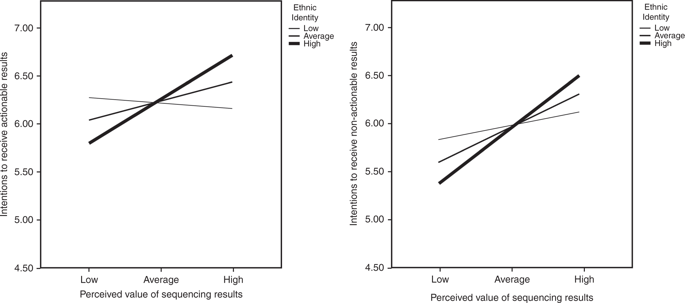当前位置:
X-MOL 学术
›
Genet. Med.
›
论文详情
Our official English website, www.x-mol.net, welcomes your feedback! (Note: you will need to create a separate account there.)
Ethnic identity and engagement with genome sequencing research.
Genetics in Medicine ( IF 8.8 ) Pub Date : 2018-12-20 , DOI: 10.1038/s41436-018-0410-0 Erin Turbitt 1, 2 , Megan C Roberts 3 , Brittany M Hollister 1 , Katie L Lewis 4 , Leslie G Biesecker 4 , William M P Klein 1, 3
Genetics in Medicine ( IF 8.8 ) Pub Date : 2018-12-20 , DOI: 10.1038/s41436-018-0410-0 Erin Turbitt 1, 2 , Megan C Roberts 3 , Brittany M Hollister 1 , Katie L Lewis 4 , Leslie G Biesecker 4 , William M P Klein 1, 3
Affiliation

|
PURPOSE
We examined the role of ethnic identity (which measures the degree to which individuals identify with their ethnic group) in beliefs about, and intentions to learn, genomic results.
METHODS
A longitudinal cohort was recruited to implement genome sequencing among healthy participants self-identifying as African, African American, or Afro-Caribbean, 40-65 years old (n = 408). Before receiving genomic results, participants completed a survey assessing social and behavioral constructs related to health, genomics, and ethnic identity.
RESULTS
Ethnic identity was positively correlated with perceived value of genomic results and expected benefits from genomic research participation. Among participants with stronger ethnic identity, cognitive beliefs (perceived value of results [b = 0.63, 95% confidence interval: 0.29, 0.98, p < 0.001] and expected benefits from genomic research participation [b = 0.32, 95% confidence interval: 0.12, 0.53, p = 0.002]) were associated with intentions to receive results. Among those with weaker ethnic identity, there was no such association.
CONCLUSION
Individuals with stronger ethnic identity seem to attend more to cognitive beliefs such as the value of genomic results when deliberating receipt of results compared with those with weaker ethnic identity. Understanding ethnic identity variation and its influence on genome sequencing perceptions and intentions can inform future research opportunities using ethnic identity to explore specific practical, clinical questions.
中文翻译:

种族认同和参与基因组测序研究。
目的 我们研究了种族认同(衡量个人认同其种族群体的程度)在对基因组结果的信念和学习意图中的作用。方法 招募一个纵向队列,在 40-65 岁的健康参与者中实施基因组测序,这些参与者自称为非洲人、非裔美国人或非洲裔加勒比人(n = 408)。在收到基因组结果之前,参与者完成了一项调查,评估与健康、基因组学和种族认同相关的社会和行为结构。结果种族认同与基因组结果的感知价值和基因组研究参与的预期收益呈正相关。在具有较强种族认同感的参与者中,认知信念(结果的感知值 [b = 0.63, 95% 置信区间:0.29, 0.98, p < 0. 001] 和参与基因组研究的预期收益 [b = 0.32, 95% 置信区间:0.12, 0.53, p = 0.002])与接收结果的意图相关。在民族认同较弱的人群中,没有这种关联。结论 与具有较弱种族认同的个体相比,具有较强种族认同的个体在考虑接收结果时似乎更关注认知信念,例如基因组结果的价值。了解种族认同变异及其对基因组测序感知和意图的影响可以为未来的研究机会提供信息,利用种族认同来探索具体的实际临床问题。在民族认同较弱的人群中,没有这种关联。结论 与具有较弱种族认同的个体相比,具有较强种族认同的个体在考虑接收结果时似乎更关注认知信念,例如基因组结果的价值。了解种族认同变异及其对基因组测序感知和意图的影响可以为未来的研究机会提供信息,利用种族认同来探索具体的实际临床问题。在民族认同较弱的人群中,没有这种关联。结论 与具有较弱种族认同的个体相比,具有较强种族认同的个体在考虑接收结果时似乎更关注认知信念,例如基因组结果的价值。了解种族认同变异及其对基因组测序感知和意图的影响可以为未来的研究机会提供信息,利用种族认同来探索具体的实际临床问题。
更新日期:2019-01-26
中文翻译:

种族认同和参与基因组测序研究。
目的 我们研究了种族认同(衡量个人认同其种族群体的程度)在对基因组结果的信念和学习意图中的作用。方法 招募一个纵向队列,在 40-65 岁的健康参与者中实施基因组测序,这些参与者自称为非洲人、非裔美国人或非洲裔加勒比人(n = 408)。在收到基因组结果之前,参与者完成了一项调查,评估与健康、基因组学和种族认同相关的社会和行为结构。结果种族认同与基因组结果的感知价值和基因组研究参与的预期收益呈正相关。在具有较强种族认同感的参与者中,认知信念(结果的感知值 [b = 0.63, 95% 置信区间:0.29, 0.98, p < 0. 001] 和参与基因组研究的预期收益 [b = 0.32, 95% 置信区间:0.12, 0.53, p = 0.002])与接收结果的意图相关。在民族认同较弱的人群中,没有这种关联。结论 与具有较弱种族认同的个体相比,具有较强种族认同的个体在考虑接收结果时似乎更关注认知信念,例如基因组结果的价值。了解种族认同变异及其对基因组测序感知和意图的影响可以为未来的研究机会提供信息,利用种族认同来探索具体的实际临床问题。在民族认同较弱的人群中,没有这种关联。结论 与具有较弱种族认同的个体相比,具有较强种族认同的个体在考虑接收结果时似乎更关注认知信念,例如基因组结果的价值。了解种族认同变异及其对基因组测序感知和意图的影响可以为未来的研究机会提供信息,利用种族认同来探索具体的实际临床问题。在民族认同较弱的人群中,没有这种关联。结论 与具有较弱种族认同的个体相比,具有较强种族认同的个体在考虑接收结果时似乎更关注认知信念,例如基因组结果的价值。了解种族认同变异及其对基因组测序感知和意图的影响可以为未来的研究机会提供信息,利用种族认同来探索具体的实际临床问题。



























 京公网安备 11010802027423号
京公网安备 11010802027423号